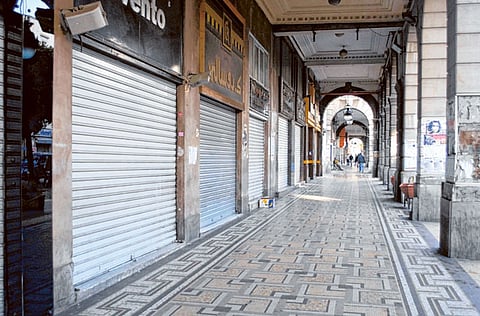Tunisia union secular counterweight to Islamists
With membership of 500,000, UGTT has network of operations with 24 regional branches

Tunis: The General Union of Tunisian Workers, or UGTT, which called a general strike Friday in protest at the murder of an opposition leader, has played a key role in Tunisia’s modern history and is a thorn in the side of the ruling Islamists.
The powerful union, which claims a membership of 500,000 and has a network of operations with 24 regional branches across the country, is capable of organising large protests and strikes in response to social grievances.
Analysts and historians say it has always been a highly politicised movement, even joining the ranks of the government after independence, before falling out with Tunisia’s first president Habib Bourguiba.
Under the decades-long rule of Zine Al Abidine Bin Ali, the UGTT was the only union, and the only national political force other than the Rally for Constitutional Democracy, the ousted dictator’s ruling party.
The UGTT was founded on January 20, 1946 by Farhat Hached, the nationalist leader whose assassination in 1952, four years before Tunisia’s independence, is blamed on a paramilitary organisation active under the French protectorate.
Its current secretary general, Housine Abassi, has headed the organisation since its first post-revolution congress.
The UGTT pursued a policy of accommodation with the former regime and often won the praise of Bin Ali, as when it dismissed local union leader Adnane Hajji who was jailed for heading a protest movement in 2008 against corruption, nepotism and unemployment.
The union’s leadership was slow to join the uprising against Bin Ali that erupted in December 2010, when a street vendor set himself on fire in protest at police harassment, but on the ground its members embraced the revolt.
It has had tense relations with the ruling Al Nahda party since the Islamists triumphed in October 2011 in Tunisia’s first free elections following the revolution.
That relationship deteriorated in December last year when a pro-Al Nahda militia attacked its headquarters in Tunis, where UGTT members had gathered to mark the 60th anniversary of Hached’s assassination.
The union called for a general strike in retaliation, which it then cancelled to avoid destabilising the country, something Ennahda has repeatedly accused it of.
Since the revolution, the movement has organised anti-government protests and regional strikes over poverty and unemployment, notably last November in Siliana, a town southwest of Tunis, which degenerated into five days of violence.
Throughout its history, the UGTT has only rarely organised national strikes, including one in 1978, after government repression of protesters and unionists left 12 people dead, and another, on January 14, 2011, the day Bin Ali fled to Saudi Arabia.
The latest stoppage, which the union called to protest the assassination on Wednesday of opposition leader and outspoken Al Nahda critic Shukri Belaid, is expected to be the biggest since Bin Ali left the country.
Sign up for the Daily Briefing
Get the latest news and updates straight to your inbox



